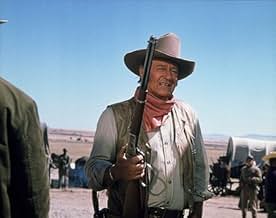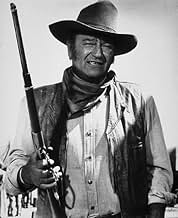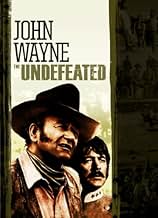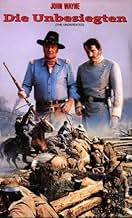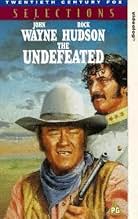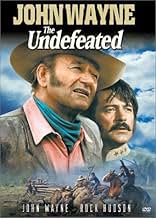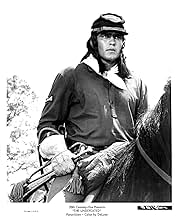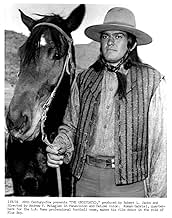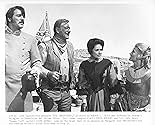Ajouter une intrigue dans votre langueAfter the Civil War, ex-Confederate soldiers heading for a new life in Mexico run into ex-Union cavalrymen selling horses to the Mexican government but they must join forces to fight off Mex... Tout lireAfter the Civil War, ex-Confederate soldiers heading for a new life in Mexico run into ex-Union cavalrymen selling horses to the Mexican government but they must join forces to fight off Mexican bandits and revolutionaries.After the Civil War, ex-Confederate soldiers heading for a new life in Mexico run into ex-Union cavalrymen selling horses to the Mexican government but they must join forces to fight off Mexican bandits and revolutionaries.
- Réalisation
- Scénario
- Casting principal
- Gen. Rojas
- (as Tony Aguilar)
- Bubba Wilkes
- (as Michael Vincent)
Avis à la une
It's a little easy to understand Thomas and his men but not so easy to understand the Langdon group. When they encounter trouble it's almost hard as a viewer to have any pity for them.
Wayne gets support from a number of actors who co-starred with him in several of his films. Veteran character actor Dub Taylor is along as a nasty Chuck Wagon driver. Former Los Angeles Rams Quarterback Roman Gabriel is cast as a native American who served for Wayne during the war and is now his main man when it comes to tracking, scouting etc. Gabriels Ram teammate Merlin Olsen is also featured as a Confederate soldier who hates to fist fight but is called upon to do so. Decent western John Wayne film all in all. The Confederates may have lost the war but in this film they certainly ate better than the Yankees do.
The set-up of story is great and loosely based on Joseph Orville "Jo" Shelby and his Missouri raiders and their families who really did seek to relocate to Maximilian's Mexico, but had to return after the victory of Juarez' forces. The movie starts with a Civil War battle and the announcement that Lee has surrendered and the war is over, which segues into Langdon and Thomas and their people going to Mexico for completely different reasons; and then they meet. This is great, but the filmmakers add some goofiness, like an over-the-top, fun-spirited brawl between the Confederates and Federals at a 4th of July party in the wilderness. These types of scenes were fairly common in Wayne Westerns at the time and I always thought they detracted from these movies. There's a way to mix realistic comedy into a movie and a way not to and this isn't the way. Besides, how can a serious brouhaha be fun? When you punch people in the face in real life they get bloody noses and missing teeth; here they just laugh it off.
Another problem is NFL quarterback Roman Gabriel as a full-blooded Native American and adopted son of Thomas. No matter how you slice it, he looks like a white dude with a mop of black hair. To add insult to injury, Langdon's cute daughter (Melissa Newman) falls head-over-heals in love with him and the way it happens simply isn't realistic. Would a genuine Southern belle really swoon over a full-blooded Indian who visits their encampment? Would no one notice that the two have wandered off to make-out, in plain view of the others? Would Col. Langdon really not mind that his daughter is sucking face with a full-blooded Native? In our day and age it's no big deal and most people could care less, but it's still an issue in some circles; how much more so back then, particularly with a proud Southern Colonel and his people?
If you can overlook these flaws, however, this is a very worthwhile Western with quality drama, action, characters and locations (shot in Baton Rouge, Louisiana, and Durango, Mexico). The cast is also notable. Besides the two stars, you also get Lee Meriwether, Marian McCargo, Jan-Michael Vincent (in a too-small role), Merlin Olsen, Ben Johnson and various Wayne Western staples.
This is a likable Western because the people are so likable. For instance, the way one group is unselfishly willing to let go of something of great worth on behalf of another group blows the mind, but it reveals their nobility and the fact that they value human beings more than they do monetary gain, but only because they've found them worthy. It also reveals respect and the willingness to forgive & heal after the nation's most bloody war.
The film runs 119 minutes.
GRADE: B-
Besides Wayne and Hudson, the cast benefits from such veteran western stalwarts as Bruce Cabot, Ben Johnson, Paul Fix, Harry Carey Jr., John Agar, and Dub Taylor. However, the film's most outstanding assets are a fine musical score by Hugo Montenegro and exceptional cinematography by William H. Clothier; Clothier captures sweeping vistas of northern Mexico, a herd of galloping horses, mounted cavalry advancing across battlefields, and horse-drawn wagons fording a river that enhance the visual spectacle of "The Undefeated."
Unfortunately, the film falters during a silly mass fist fight between the Northerners and Southerners, and the anachronistic romance between a Native American scout and Langdon's daughter creates a time warp; the pairing of a Southern white woman with a Native American in the days after the fall of the Confederacy is pure fantasy. Well coiffed and made-up ladies in formal French gowns dining on make-shift tables outside their covered wagons is also a stretch of credibility; no dust or grime intrudes on their frontier life. The friendly bonding between the former adversaries Langdon and Thomas and their followers is equally unlikely, and, although Wayne and Hudson make strange bedfellows, they work well together. While not among the landmark westerns of Wayne's career, "The Undefeated," elevated by Clothier's outstanding cinematography, Montenegro's score, and a supporting cast of familiar western faces, is solid entertainment and well worth discovering or re-discovering.
"The Undefeated" is the Duke's biggest large-scale epic since "The Alamo" a decade earlier. The battle scenes and the shots of the horse drive are stirring and impressive.
Another thing that separates this film from other post-1965 Wayne westerns (except for "The Cowboys") is the dialog. It's sharp, crisp, witty and often fun.
Here's a good example of that sharp, witty & pointed dialogue: Duke and co-star Rock Hudson had just returned to their camp after being forced to kill a Mexican bandit leader, who, with his gang wanted Rock & Duke's valuables, their horses and their women. When one of the women asks the Duke why he had to kill him, he replied matter of factly, "The conversation sorta dried up." Classic stuff!
And Hugo Montenegro's memorable score is terrific - the best work I personally have heard from him. It helps perpetuate the whole notion that this is indeed an epic western.
I'm amused at some of the wanna-be Rex Reed's here, the "I am a critic so I can't really, actually, truthfully admit that I loved something like this" with their "ho hum, it's passable, I guess"; and their "it's an okay time killer if you've got nothing better to do." How too, too cool. Give me a break, you elitist wanna-be's!
"The Undefeated" is long on length and even longer on entertainment. This is a grand western.
Le saviez-vous
- AnecdotesBefore filming began, John Wayne had to lose most of the weight he had put on in order to play Rooster Cogburn in 100 Dollars pour un shérif (1969).
- GaffesA number of times in the early part of the movie, reference is made to the surrender of Robert E. Lee to Ulysses S. Grant as the end of the war. Although the surrender of Lee is now seen as the effective end of the war, at the time it was not and would not have been considered such by most people (the Confederate major in the opening battle being an example). Organized military operations continued for more than a month after Lee's surrender.
- Citations
Col. James Langdon: If I can find the time, I'm going to sit down and write the social history of bourbon.
- ConnexionsFeatured in Rock Hudson's Home Movies (1992)
Meilleurs choix
Détails
Box-office
- Budget
- 7 115 000 $US (estimé)
- Durée1 heure 59 minutes
- Rapport de forme
- 2.35 : 1


